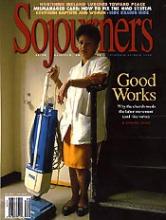Say "Los Angeles" and just about anyone imagines film studios, sprawling mansions of the rich and famous, and Baywatch life guards. This metropolisthe second largest in the United Statesalso is gaining recognition nationally because of the way in which labor, civic groups, and the religious community are coming together to build a new movement for economic justice.
A historic victory came March 18, 1997, when the Los Angeles City Council voted in a living wage ordinance, despite opposition from Mayor Richard Riordan and the business community.
This decision did not occur in a vacuum. It was made after the concerted lobbying of the Living Wage Coalition brought the inequities suffered by the working poor to the public's conscience. The coalition included strong participation from the religious community, whose grassroots efforts have been directed since 1996 by an interfaith group, Clergy and Laity United for Economic Justice (CLUE). CLUE, according to Donald Smith of the Presbyterian Synod of Southern California and Hawaii, "has brought together the largest number of labor-oriented religious activists since the farm worker movement of the 1960s."
In the months leading up to the vote, CLUE members educated and mobilized others in their congregations, participated in public events to focus attention on the needs of workers living in low-wage poverty, and developed special relationships with council members. It became commonplace for well-known religious figures to step forward alongside low-wage workers and the unemployed to speak out for better wages and working conditions.
On the day of the vote, City Hall was packed with living wage supporters who testified to the council. Miraculously, the ordinance, requiring city contractors to pay employees $7.25 an hour with health insurance or $8.50 without, was unanimously adopted, 12-0, avoiding the mayor's veto.
Read the Full Article
